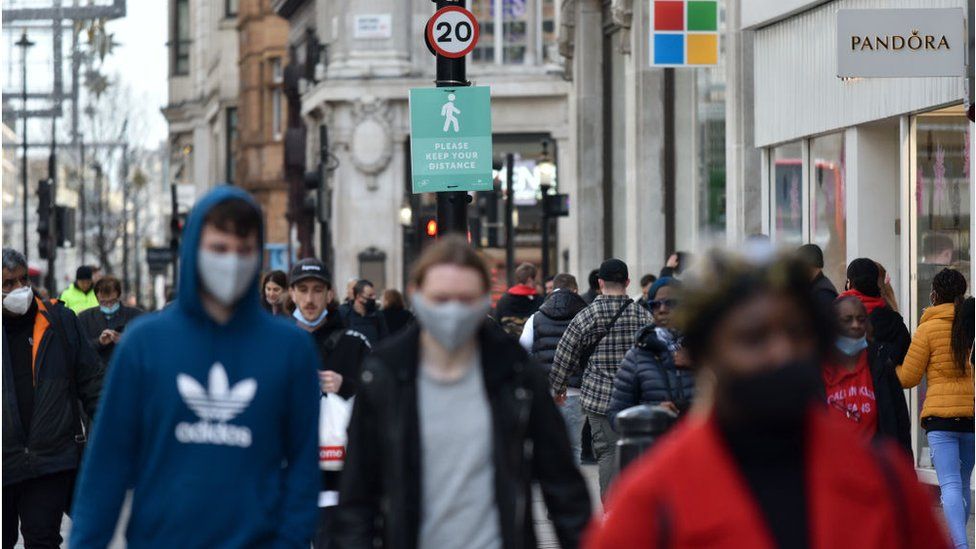
Politicians like to compare current events with history. But there is a reasonable doubt as to just how helpful it is to reference, for example, the Great Frost of 1709 in relation to last year's pandemic.
In the current globalised world, what matters more is international comparisons. Right now, for example, it is clear the UK's vaccination performance exceeds that of comparable countries.
In the first months of the pandemic it was similarly clear that the UK's increase in the proportion of excess deaths was the worst of the major economies. (Perhaps those two facts are linked - given the first wave impact, both in terms of health and politics, was the UK willing to go further, work harder, and pay more for quicker access to jabs?)
Now, just over two months after the end of a generally dreadful 2020, we can begin to make comparisons of the performance of international economies, as well as the policy response.
Growth upgrade
The OECD is the developed world's think tank and such comparisons are its bread and butter. On the face of it its new economic forecasts released this morning contained the happy news of an upgrade to UK growth prospects this year to a whopping 5.1%, after the success in rolling out vaccines.
However, we are on the rebound from what, on the OECD's analysis of official figures, is the worst 2020 economic hit in the G7 group of the most industrialised countries. In fact, the OECD went further with a chart comparing growth in the fourth quarter of 2020 with growth in the same quarter in 2019, showing the UK at the bottom of the much wider G20 grouping too.
On the more conventional annual growth measure, only Argentina had a worse 2020 in terms of the fall in the size of the economy.

Now, it is true to say that the UK's more meticulous measure of public services, such as the output of teachers, does affect the degree of comparability here, as the chancellor argued in an interview with me last month.
However, the Office for Budgetary Responsibility (OBR) dealt with that argument at the Budget by showing that when government consumption was excluded, Italy and France took nearly as hard hits - but this did not actually change the UK's position at the bottom of the 2020 G7 growth table.
Back to the OECD this morning, which tried to measure the overall path of the world's major economies through until the end of 2022 compared to what it had projected before the pandemic. On that measure, it predicts the UK will be hit less than some big G20 developing countries such as India, Mexico and Argentina, as well as Spain.
But it's still by some distance on course for the biggest hit in the G7, on this measure. At the end of 2022 the UK economy would still be 4% smaller than the OECD's pre-pandemic forecast, the think tank says.
Significant questions
The contrast with the US, though, is really interesting. On the back of President Biden's massive stimulus package, the OECD says the US economy, by the end of next year, is going to be nearly 1% larger than late 2019 forecasts. The OECD has raised its forecast for the US economy this year by 3.3%.
The analysis raises some significant questions.
Firstly, combining the OBR and OECD analysis, we can conclude that the UK's economic performance during the 2020 calendar year was at the bottom of similar G7 countries, and close to the bottom of the G20 too. This is also partially down to the fact that the UK has a high level of "social consumption"- recreation, restaurants and hotels.
As the OBR concluded in its Budget documents, the "primary reason the UK has suffered a greater economic hit" is "simply that the UK experienced higher rates of infections, hospitalisation and deaths from the virus than other countries". It also "spent longer in stricter lockdowns".
Secondly, while the extent of that underperformance depends on how growth is measured, it raises doubts that the rapid vaccine rollout will make up for 2020. Certainly the OECD is still predicting an initial rebound followed by a slowish recovery, slower than most other rich countries by the end of next year.
The government will have an incentive to push for a quicker reopening and therefore demonstrable economic benefits from the vaccination successes. This is likely to be a point of tension in politics. But there may be greater upside here for the UK economy.
Lastly, the size of the US stimulus, which remember comes as that economy opens up from lockdowns less strict and less extensive than in the UK, is colossal. The UK government clearly has a fixed eye on its debt levels, and interest costs, so for now it is not following the Biden/ Yellen path. What follows will be an experiment in who has got this recovery phase right.
https://news.google.com/__i/rss/rd/articles/CBMiLGh0dHBzOi8vd3d3LmJiYy5jby51ay9uZXdzL2J1c2luZXNzLTU2MzI4ODYz0gEwaHR0cHM6Ly93d3cuYmJjLmNvLnVrL25ld3MvYW1wL2J1c2luZXNzLTU2MzI4ODYz?oc=5
2021-03-09 16:21:15Z
CBMiLGh0dHBzOi8vd3d3LmJiYy5jby51ay9uZXdzL2J1c2luZXNzLTU2MzI4ODYz0gEwaHR0cHM6Ly93d3cuYmJjLmNvLnVrL25ld3MvYW1wL2J1c2luZXNzLTU2MzI4ODYz
Tidak ada komentar:
Posting Komentar